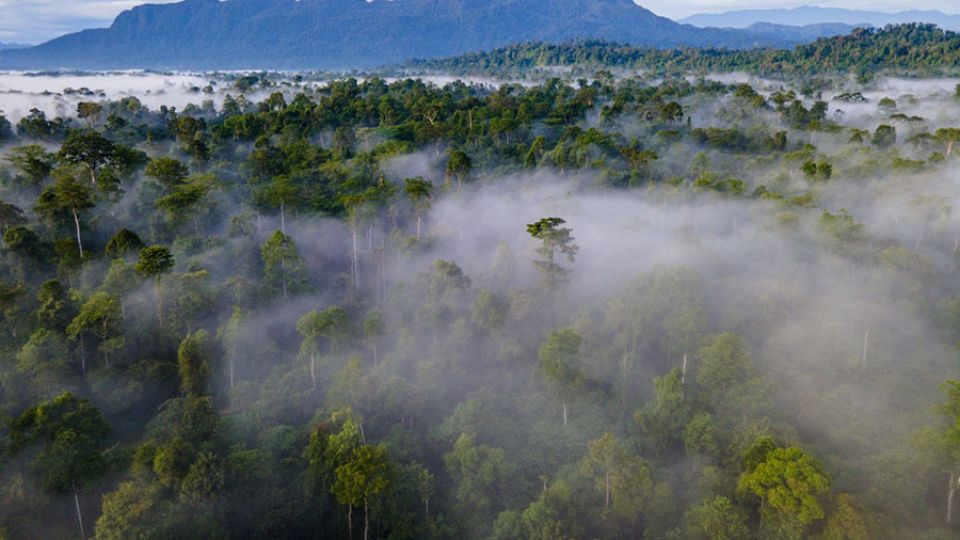November 24, 2025
JAKARTA – Indonesia has endorsed the first global agreement that aims to protect land tenure rights for indigenous communities living in tropical forests around the world, a move met by skepticism from environmentalists due to the lack of policies, and persistence of land grabs in the country.
The deal, the Intergovernmental Land Tenure Commitment (ILTC), was launched on the sidelines of the United Nations climate change conference (COP30) in Belém, Brazil, on Nov. 17. It sets a target for the recognition of 160 million hectares of customary and community lands, an area four times the size of Norway, by 2030.
Under the agreement, 14 endorsing countries have pledged to secure and strengthen land tenure rights for indigenous communities, including a 63 million ha commitment from Brazil and a 50 million ha commitment from the Democratic Republic of Congo, according to a statement issued by the Forest and Climate Leaders’ Partnership.
During the ILTC launching event in Belém, the Forestry Ministry reaffirmed Indonesia’s target to grant 1.4 million ha of forest to indigenous communities by 2029.
“Indigenous peoples and local communities play significant roles in creating traditional knowledge and sustainable practices as well as managing vital ecosystems, including their crucial roles in climate action,” said Julmansyah, the Forestry Ministry’s director for tenurial conflict and customary forest management, as quoted from a statement from the ministry.
The 1.4 million ha target, he added, is a part of the national climate strategy that places indigenous and local communities as an important pillar.
“This bold commitment represents a crucial part in the struggle against climate change, namely meaningful participation from indigenous people and local communities.”
A tiny fraction
However, Indonesia’s current customary forest commitment is considered “weak” and to have failed to outpace the land grab practices that have continued to deprive indigenous communities of lands and forests over the years, according to Sutami Amin, researcher at indigenous watchdog Pusaka Bentala Rakyat.
“The 1.4 million ha is only a tiny fraction of the forest and customary lands the government has granted for notable projects,” Sutami said on Thursday.
He referred to the country’s 2025-2029 National Medium-Term Development Plan (RPJMN), which outlined a project to develop 2.3 million ha of land for rice fields and sugarcane plantations in Merauke, South Papua.
A participant signs a petition banner against the National Strategic Project (PSN) during the Merauke Solidarity Declaration on March 14 at the Petrus Vertenten Center in Merauke, South Papua. Keen to end its reliance on rice imports, Indonesia wants to plant vast tracts of the crop, along with sugar cane for biofuel, in Papua, a move environmentalists warn could become the world’s largest deforestation projects, threatening endangered species and the country’s climate commitments. (AFP/Mighty Earth/Yusuf Wahil)
The project has been included in the list of National Strategic Project (PSN).
First introduced by then-president Joko “Jokowi” Widodo in 2015, the list has historically prioritized large-scale infrastructure and other projects deemed crucial for driving economic growth and improving social welfare in the country. PSN-status projects enjoy wide-ranging government support, from fast-tracked licensing and land acquisition assistance to priority in permit issuance.
The Merauke sugarcane plantation project, whose yield would be mainly used for biofuel development, has created additional risks to the marginalization of indigenous Papuans, Sutami.
As of August, sugarcane plantation companies affiliated with PSN projects had cleared at least 4,912 ha of customary forest belonging to the Yei indigenous tribe in Southwest Papua, according to data from Pusaka.
“Granting recognition does not guarantee that indigenous communities can perform their economic activities and cultural traditions safely,” Sutami said.
Biofuel sourced from sugarcane is also often promoted as an environmentally-friendly fuel to replace fossil fuels. But environmental groups have rejected the expansion of such a fuel, with Greenpeace Indonesia calling it “a false solution” in battling the energy and climate crisis.
To genuinely protect local communities, Sutami urged policymakers to focus on passing the long-stalled indigenous peoples’ rights bill, which is expected to grant vital legal rights for indigenous people and recognition of their land and natural resources.
First proposed in 2010, the indigenous people bill has been included in the House of Representatives’ annual National Legislation Program (Prolegnas) priority bills for some years, including 2025. But lawmakers have failed to discuss or pass it into law.


